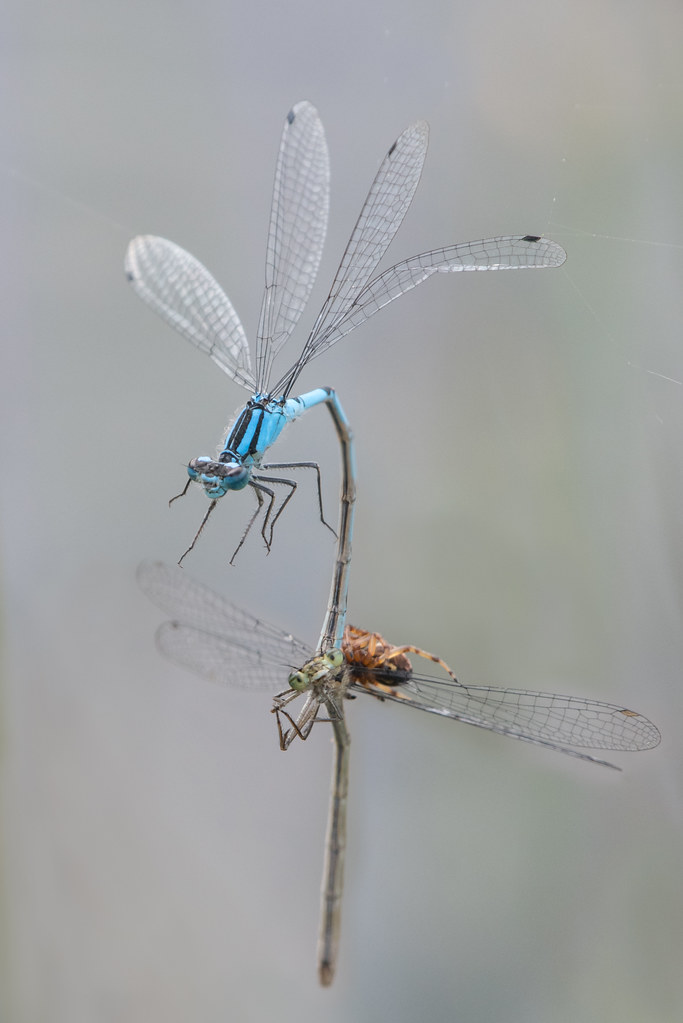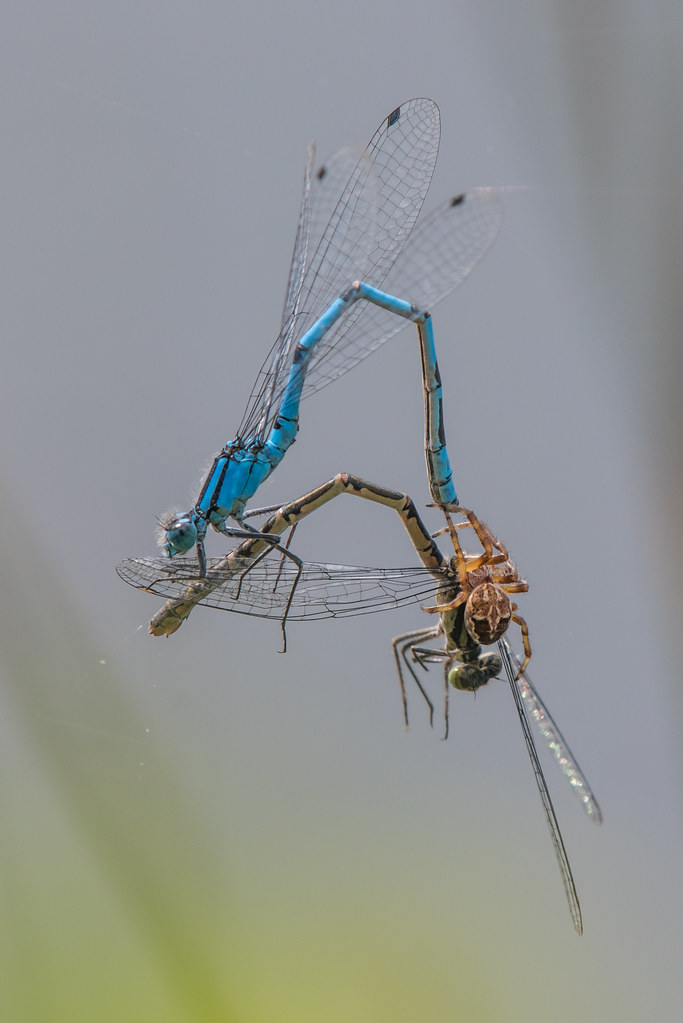
Tim writes: I stumbled upon this macabre scene where a mating pair of Common Blue Damselflies (Enallagma cyathigerum) had become entrapped in the web of a Garden Spider (Araneus diadematus). The spider was busily dispatching the female damselfly, while the male, also entrapped by the web, continued to hold onto her. You can see the spider busy at the back of her head but then she started to move towards the male, and that was the point he decided to release his grip. I took these photographs with a 420mm lens as the web was over water on a moorland pool near Holmfirth in West Yorkshire.
To be strictly accurate, the damselflies are not actually mating, but he is mate guarding. That is because in certain Odonata the aedeagus (the equivalent of a penis in insects) is equipped with hooks that can remove the sperm package from a previous mating. So male dragonflies and damselflies usually keep hold of the female after they have mated in order to guard her until she has laid all her eggs.

Hi Mark and Tim
Great photo, but the spider is not Araneus diadematus. It is in the genus Larinioides of which there are three species in Britain. The most frequently encountered is Larinioides cornutus, which is associated with damp grassland, wetland edge, wherever there is taller, vegetation.
However, I think this is actually the less frequently encountered Larinioides sclopetarius (see http://srs.britishspiders.org.uk/portal.php/p/Summary/s/Larinioides+sclopetarius for a map and ecology) based on the females abdominal markings.
To be absolutely certain, close inspection of the females epigyne is required. But am reasonably confident it is this species. For those who read this blog and live in Leeds, a colony of L.sclopetarius resides on the metal fencing surrounding the cafe at Roundhay Park.
The third species in the genus present in Britain, Larinioides patagiatus, is much less frequently encountered as the map and ecology suggests http://srs.britishspiders.org.uk/portal.php/p/Summary/s/Larinioides+patagiatus. Indeed, it is on the Amber list of spiders that are potentially declining sufficiently to warrant adding to those who are already on the IUCN Near Threatened, or Threatened list.
Richard – many thanks. I love the deep expertise of many commenters on this blog. (I am, of course, just guessing that you know what you are on about!!)
Well, I appreciate that it must be difficult from your perspective as to whether or not ‘a correction’, is indeed, correct! And you raise a valid point: how reliable are the comments; and to what extent, reliance can be placed on them, when you don’t know, or don’t know very well, the commentator?
I hope I am correct; and I have checked carefully from a couple of reliable resources: one of which is the excellent ‘Britain’s Spiders: A field guide’, published by WildGuides in association with the British Arachnological Society (www.britishspiders.org.uk).
I am as confident as I can be that it is L.sclopetarius.
And in terms of my experience, simply for the record, I have been studying spiders since the early 1990s, so I have a reasonable track record. Indeed the first bit of paid ecology work I ever did was for the RSPB, at Minsmere, surveying invertebrates, including spiders, to inform a study of the Reserve’s potential to support breeding stone curlew (the spiders and other invert fauna being the stone curlews prey).
On the infrequent occasions I go back, and see stone curlew, a little bit of pride wells up inside of me as I played a minuscule part in this species’ return.
And by the way, I recorded substantially over 200 species of spider at Minsmere: I wonder how many more have been recorded since?
Richard – I don’t doubt you!
Many thanks indeed for your input Richard. I will change this on my Flickr site too. Spiders are definitely not my area of expertise. I also liked your comments about not knowing how reliable commentators are on the internet. That is one reason I rarely comment openly on (usually bird) identifications because it is a democracy rather than a meritocracy. Politically I’m in favour of a democracy but I’d rather rely on expertise rather than weight of opinion on identifications.